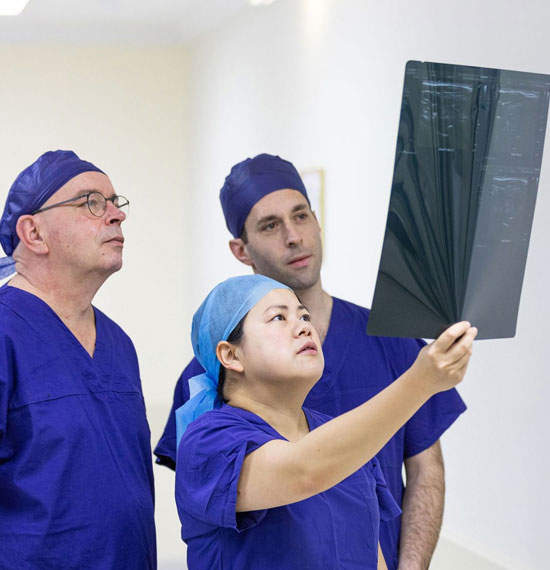Benign Tumour Treatment Specialist in Sydney
What is a benign condition?
Benign is the term used to refer to a condition, a tumour or a growth that is not malignant (cancerous). This means it doesn’t invade nearby tissue or spread to other parts of the body.
Benign is often used to describe a condition that is not dangerous or serious. Many growths and tumours including breast tumours are benign and are not harmful.
What are benign tumours?
A tumour is a solid mass of tissue that forms in the body when abnormal cells group together and can form anywhere in the body. Benign tumours are very common and can affect bones, skin, tissue, organs, and glands. Unlike cancerous tumours, benign tumours don’t spread (metastasize) to other parts of the body.
When old or damaged cells die, our body replaces them with new healthy cells. Benign tumours happen when the body’s cells divide and grow at an excessive rate and the body loses the ability to balance the rate of growth and division. A tumour occurs when the dead cells remain in the body and form a growth.


Who is at risk of developing a benign tumour?
People of any age including children can develop a benign tumour although they occur more commonly as we age.
What are the types of benign tumours?
There are quite a number of different benign tumours that can develop. They are classified by where they grow and include:
Lipomas: grow from fat cells. These are the most common type of benign tumour. They often grow on the back, arms, or neck.
Myomas: grow from muscles or in the walls of blood vessels and are most commonly found in the uterus or the stomach.
Adenomas: are in the thin layer of tissue covering glands, organs and other internal structures and polyps.
Nevi or “moles”: are very common and are non-cancerous growth on the skin.
Fibroids: are found in the fibrous tissues around the organs and are most common in the uterus.
What are the symptoms of a benign tumour?
Not all tumours, whether they are benign or cancerous have symptoms. However, dependent on the location of the tumour, there can be impacts on important organs or the senses. If the tumour is large enough and near to the skin or located in soft tissue such as the abdomen or breast, it may be detected by touch, however most benign tumours are not large enough to cause discomfort or pain.
Depending on the tumour’s location, possible symptoms can include:
- Pain or discomfort
- Tiredness or fatigue
- Weight loss
- Appetite loss
- Chills, fever, or night sweats
- Skin discolouration
How are benign tumours diagnosed?
The specialists at Sydney Surgical Clinic use a variety of techniques and laboratory tests to diagnose benign tumours. Typically, when you attend for a consultation, our specialist will discuss your medical history, conduct a physical examination, and ask about any symptoms you may be experiencing.
Diagnostic imaging tests may then be undertaken. The type of imaging test is determined by the specialist based on the tumour type and location and can include:
- CT scan
- MRI
- Mammogram
- Ultrasound
- X-ray
Our specialist may also arrange for a blood test or to biopsy (take a sample of the tumour for laboratory testing) to determine whether it is benign or malignant. Biopsy test vary depending upon the location of the tumour and can include:
- Skin sample taken using a local anaesthetic (usually for skin tumours)
- Fine needle biopsy (can be used for breast lumps)
- Colonoscopy
- Endoscopy
How are benign tumours treated?
Not all benign tumours require surgical removal, and some may never need treatment. For example, if the tumour is small and you are not experiencing any symptoms your specialist may recommend a “watch and wait” approach. If surgery is believed necessary, the type required will depend on the tumour’s location. Some reasons for treating benign tumours include:
- Cosmetic reasons – if the tumour is visible on the face or neck
- Tumours that are affecting organs, nerves, or blood vessels to prevent further problems
Most often, tumour surgery by the Sydney Surgical Clinic’s specialists is done using minimally invasive endoscopic techniques. This means there are smaller surgical incisions (if any) and faster healing time.
Endoscopies and colonoscopies are common treatment procedures provided in a day surgery setting and require almost no recovery time.
In some instances, the Sydney Surgical Clinic specialists may recommend a non-surgical treatment of radiation therapy to help reduce the tumour’s size and prevent it from growing.
As a general rule, the more invasive the treatment required to treat the tumour, the longer the recovery time.
All tumours should be checked by a specialist and monitored
Many benign conditions do not require treatment if they are not causing symptoms or complications, but they should be checked by a specialist and continue to be monitored and watched for any changes as benign conditions can become cancerous over time and early detection is important for better outcomes.
If you have noticed a lump or mass, or you are experiencing any of the symptoms listed above, speak with your GP, and arrange for an examination. They will then be able to determine whether you need specialist attention and can refer you to Sydney Surgical Clinic.




